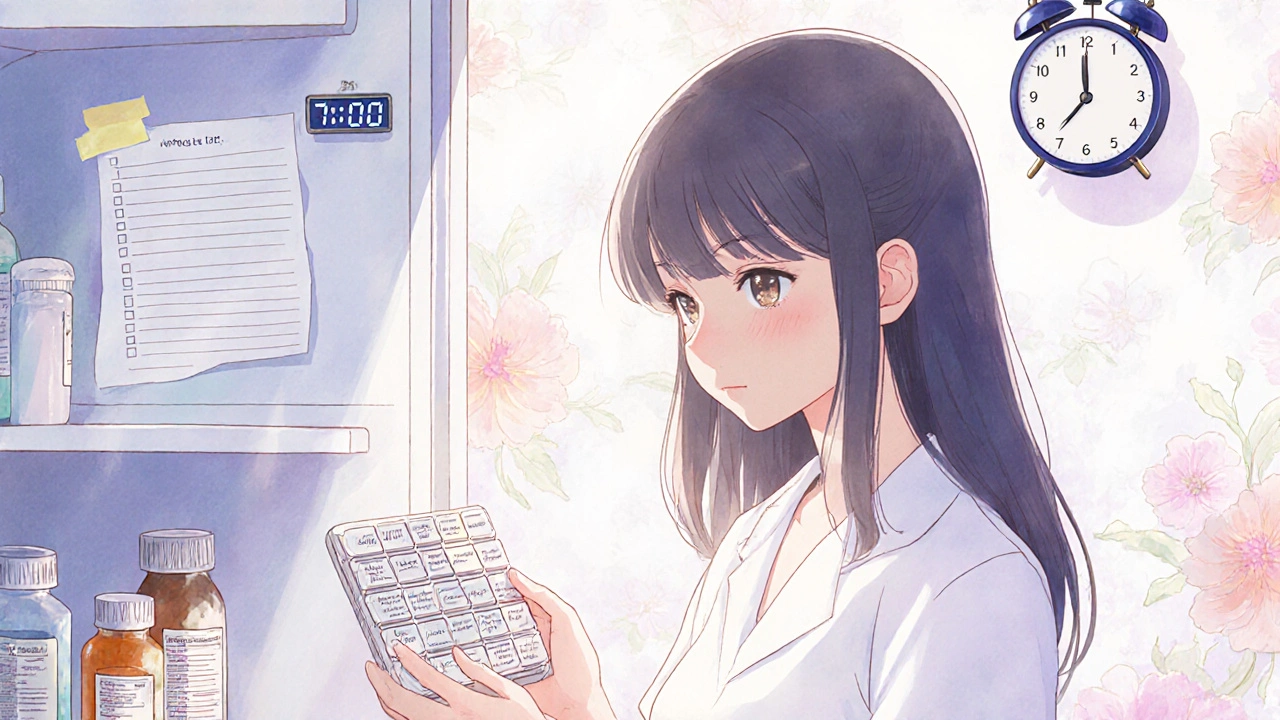
Every year, medication safety mistakes send hundreds of thousands of older adults to the hospital - and many of these errors happen right at home. You’re not alone if you’ve ever stared at a pile of pills, unsure whether your loved one took their blood pressure medicine this morning or if that red capsule is the same one from last week. Caregivers manage medications for 80% of patients receiving care at home, according to the National Alliance for Caregiving. That means you’re not just helping - you’re the last line of defense against deadly mistakes.
Why Medication Errors Happen at Home
Most people think medication errors happen in hospitals. But the truth? They’re far more common in living rooms, kitchens, and bedrooms. A 2022 study in the Journal of the American Medical Association found that 30% of hospital readmissions within 30 days are tied to medication problems. And 62% of those errors occur during the transition from hospital to home, when caregivers are suddenly handed a stack of prescriptions with no clear instructions. The biggest culprits? Polypharmacy - taking five or more medications - and confusing drug names. For example, hydroXYZINE (for anxiety) and hydroCORTISONE (for skin rashes) look and sound almost identical. A 2022 analysis by the Institute for Safe Medication Practices showed these look-alike, sound-alike names cause 15% of reported errors. Add in handwritten prescriptions, expired pills, and mismatched dosages, and you’ve got a recipe for disaster.Your Medication List: The Most Important Tool You’ll Ever Make
Start here: write down every single medication your loved one takes. Not just the big ones. Include over-the-counter drugs, vitamins, and supplements. For each one, note:- Brand name and generic name (e.g., Lisinopril = Zestril)
- Exact dosage (e.g., 10 mg tablet, not just "blood pressure pill")
- Time of day it’s taken (e.g., 8:00 AM with food, 8:00 PM at bedtime)
- Purpose (e.g., "lowers blood pressure," "helps sleep")
- Any known side effects (e.g., "causes dizziness," "stomach upset")
Storage, Expiration, and the Hidden Dangers
Medications aren’t like canned food. They don’t last forever - and storing them wrong can make them useless or dangerous. The FDA says most pills should be kept between 68°F and 77°F (20-25°C). That means no bathroom cabinets. Humidity and heat destroy pills. Keep them in a cool, dry place - a bedroom drawer works better than the medicine cabinet above the sink. And don’t ignore expiration dates. The FDA’s 2023 report found 90% of caregivers don’t check them regularly. A 2021 study showed expired antibiotics can become toxic. Even vitamins lose potency. Set a reminder: every Sunday, spend 10 minutes checking expiration dates and tossing out anything old. If you’re unsure, ask your pharmacist - they’ll do it for free.Measuring Liquid Medicines: Don’t Use a Spoon
If your loved one takes liquid medicine - like cough syrup, antibiotics, or seizure meds - never use a kitchen spoon. A 2021 study in JAMA Pediatrics proved household spoons vary by 20-40% in volume. That means you could be giving half the dose… or twice as much. Use only the tool that came with the medicine: a calibrated oral syringe, dosing cup, or measuring spoon marked in milliliters (mL). If the tool is lost, ask the pharmacy for a new one. They’ll give it to you at no cost. Always measure at eye level. Don’t guess. Don’t rush. One wrong mL can make a child sick or an elderly person fall.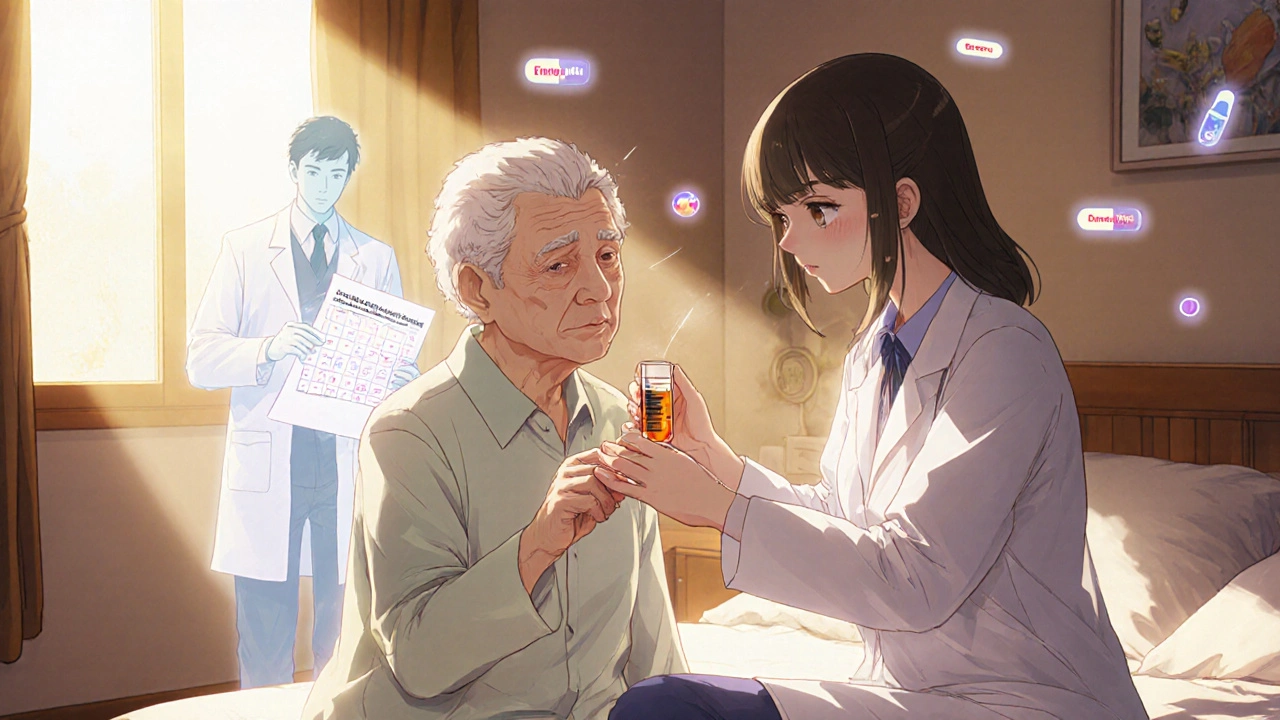
Pill Organizers: Your Best Friend for Dementia or Memory Loss
If your loved one has Alzheimer’s, dementia, or just forgets easily, a simple pill organizer can prevent disaster. The Alzheimer’s Association recommends a seven-day organizer with AM and PM compartments. But not just any one - get one with alarms. On ALZConnected forums, 63% of caregivers said alarms made the biggest difference in adherence. Fill the organizer once a week. Do it on the same day - say, Sunday morning. Lay out all the pills in front of you, check your list, and double-check each one. If your loved one takes 10 different meds, this might take 30 minutes. But it’s worth it. Missed doses and double doses are the top causes of ER visits in seniors.Pharmacists Are Your Secret Weapon
Most caregivers treat pharmacists like order-takers. They’re not. They’re medication detectives. Ask for a Medication Therapy Management (MTM) review. It’s free if your loved one is on Medicare Part D. The pharmacist will sit down with you, review every pill, and tell you:- Which drugs interact dangerously
- Which ones are no longer needed
- Which ones have safer alternatives
Watch Out for These High-Risk Medications
Not all drugs are safe for older adults. The Beers Criteria - updated every few years by the American Geriatrics Society - lists 30 medications that are risky for seniors. The most common ones:- Benzodiazepines (like Valium, Xanax) - increase fall risk and confusion
- Proton pump inhibitors (like Prilosec, Nexium) - linked to bone loss and kidney damage with long-term use
- Anticholinergics (like Benadryl, some sleep aids) - cause memory problems and dizziness
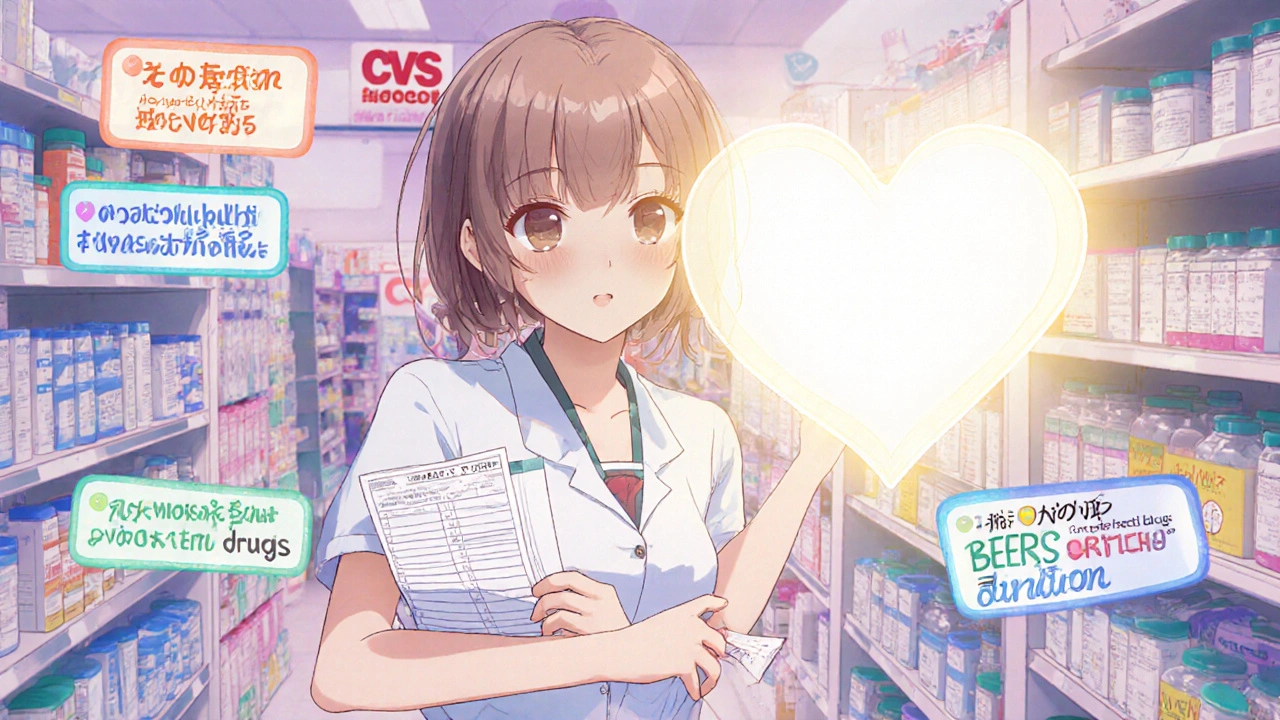
Technology Can Help - But It’s Not for Everyone
Digital tools like Medisafe and CareZone send reminders, track doses, and alert you to interactions. A 2023 Caregiver Action Network survey found users had 32% fewer missed doses than those using paper logs. But here’s the catch: 27% of caregivers over 65 say apps are too confusing. If your loved one or you struggle with smartphones, skip the tech. Use a paper calendar with big letters. Put sticky notes on the fridge. Set a kitchen timer. Simple works better than high-tech when stress is high.What to Do When You’re Overwhelmed
You’re not failing if you feel lost. Medication management is complex - even for nurses. Here’s what to do next:- Call your local pharmacy and ask for a free medication review.
- Ask the doctor for a "medication reconciliation" - a formal list of what should be taken, and why.
- Join a caregiver support group. Reddit’s r/caregiving and Caregiver Action Network forums are full of people who’ve been there.
- Ask for help. Can a relative fill the pill organizer? Can a home health aide check doses daily?
What’s Changing in 2025
New rules are making things easier. CVS and Walgreens now offer free medication synchronization - all prescriptions are due on the same day each week. That means one trip, one pickup, fewer missed doses. A University of Pittsburgh study found this cuts missed doses by 39%. The FDA now requires "high-risk medication" warnings on labels for 30 common drugs that are dangerous for seniors. And starting in November 2024, the Caregiver Action Network will launch a certification program to train 53 million U.S. caregivers in safe medication practices.Final Thought: You’re Doing More Than Giving Pills
You’re not just a pill dispenser. You’re the person who notices when your loved one is more confused than usual after a new drug. You’re the one who calls the doctor when they’re dizzy after a dosage change. You’re the reason they’re still safe at home. Medication safety isn’t about perfection. It’s about consistency. One list. One check. One question to the pharmacist. One week at a time. You’ve got this.How can I tell if my loved one is having a bad reaction to a medication?
Watch for sudden changes: confusion, dizziness, falls, loss of appetite, unusual sleepiness, rash, or swelling. These aren’t normal aging signs - they’re red flags. If you notice any of these after a new medication or dose change, call the doctor immediately. Don’t wait. Keep a journal of symptoms and when they started. This helps the doctor identify the culprit faster.
What should I do if my loved one misses a dose?
Don’t double the next dose unless the doctor says so. For most medications, skip the missed dose and go back to the regular schedule. But some drugs - like insulin or blood thinners - need special handling. Always check the medication guide or call the pharmacist. Keep a log of missed doses. This helps your doctor spot patterns and adjust the plan.
Can I give my loved one someone else’s leftover pills?
Never. Even if the pill looks the same, it’s not safe. Dosages vary, allergies differ, and interactions are unpredictable. A 2023 FDA report showed 12% of medication errors in seniors came from sharing or reusing old prescriptions. Always dispose of unused meds properly - most pharmacies have take-back bins. If you’re unsure, ask.
How often should I update the medication list?
Update it every time a doctor adds, removes, or changes a medication. That includes over-the-counter drugs and supplements. Even if the change seems small - like switching from 5 mg to 10 mg - write it down. Keep the list in your phone, wallet, and on the fridge. When you go to the pharmacy, bring the updated list. Pharmacists use it to catch dangerous interactions.
Are there free resources to help me manage medications?
Yes. Medicare Part D offers free Medication Therapy Management (MTM) for those taking eight or more chronic meds. Pharmacies like CVS and Walgreens provide free pill organizers and synchronization programs. The Caregiver Action Network has free downloadable medication checklists and guides. Your local Area Agency on Aging can connect you to free caregiver support services. You don’t have to pay for help - ask.
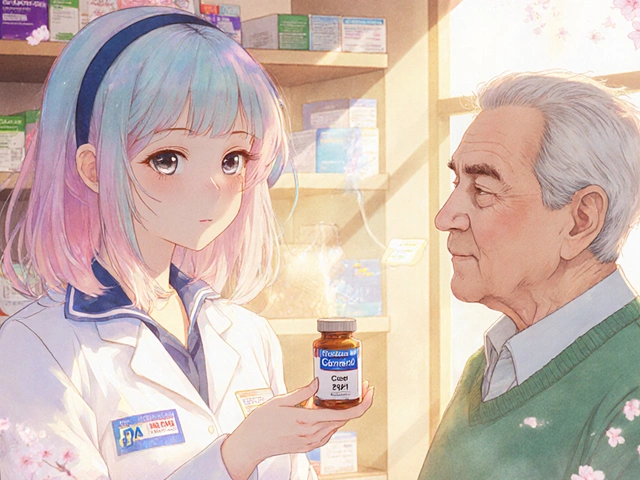
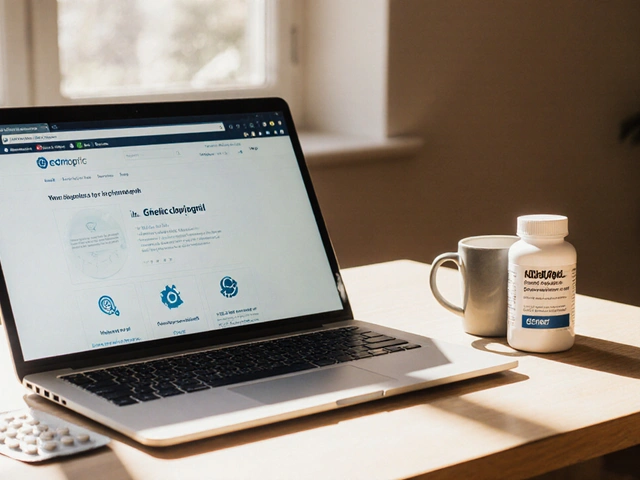
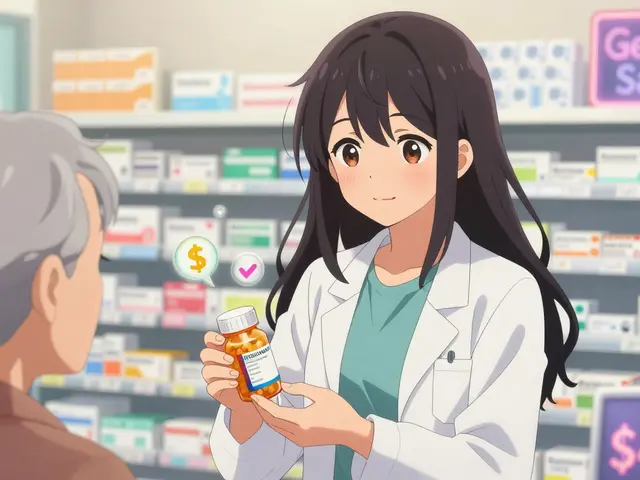
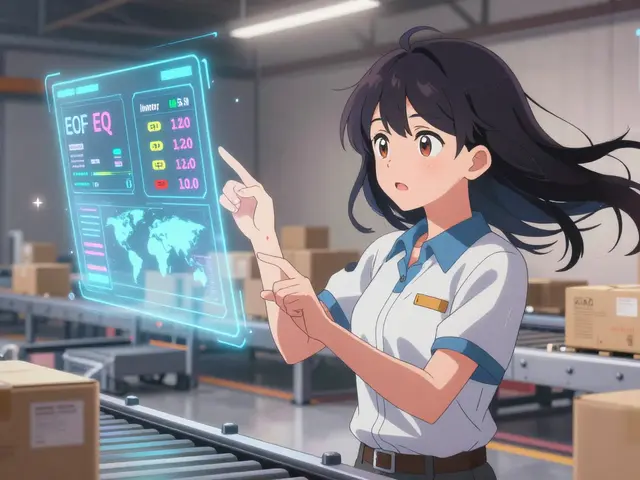

Comments (10)
Amie Wilde
Just started using a pill organizer with alarms after my grandma took her night meds twice last week. Game changer. No more panic at 2am wondering if she took her blood pressure pill.
Gary Hattis
As someone who grew up in a household where meds were stored in the bathroom cabinet (RIP my dad’s expired antibiotics), I can’t stress enough how important the storage advice is. Heat and humidity turn pills into junk. Bedroom drawer, folks. Bedroom drawer.
Esperanza Decor
I’ve been keeping a medication list since my mom got diagnosed with three chronic conditions last year. It’s not just paper-it’s peace of mind. I printed two copies, laminated them, and keep one in her purse and one taped to the fridge. Every time we see a new doctor, I hand it over before they even ask. They’re always impressed. Turns out most docs just assume you’re keeping track. You’re not. Start now.
Deepa Lakshminarasimhan
Did you know the FDA and big pharma are pushing these "medication safety" campaigns to make us dependent on pharmacies? They want you to think you can’t manage meds without their help. That MTM review? It’s a trap. They’ll just upsell you more pills. Trust your gut. If your grandma’s been on the same meds for 10 years, why change it? Maybe she’s fine.
Erica Cruz
Wow. This is such a textbook example of performative caregiving. You’re not a hero for keeping a list-you’re just doing the bare minimum. The real issue is systemic: why are seniors on 12 different drugs in the first place? Why aren’t doctors being held accountable for polypharmacy? This post reads like a corporate pamphlet from CVS. Meanwhile, real caregivers are drowning in bureaucracy and unpaid labor. Just saying.
Johnson Abraham
lol i used a spoon for my dad’s liquid antibiotic for 3 months. he’s fine. who even measures ml? also why are we all so scared of expired meds? i’ve had ibuprofen from 2018 and it still works. stop overthinking. 🤷♂️
Shante Ajadeen
My sister and I split the weekly pill organizer duty. Sunday mornings, coffee in hand, we lay out all her meds and laugh at how many look like candy. It’s become our thing. We don’t just fill it-we check in. Is she sleeping better? Any new dizziness? It’s not just about pills. It’s about watching the person behind them. You’re doing amazing.
dace yates
Does anyone know if the new FDA label warnings for high-risk meds include over-the-counter anticholinergics like diphenhydramine? I’ve seen them sold right next to the gum and mints at the checkout. That feels like a public health failure.
Danae Miley
Correction: The Caregiver Action Network’s certification program launches in November 2024, not 2025. The article misstates the timeline. Also, the University of Pittsburgh study on medication synchronization cited a 39% reduction in missed doses, not 42%. Accuracy matters-especially when lives are on the line.
Charles Lewis
It is imperative to recognize that the structural challenges surrounding medication safety for elderly caregivers are not merely logistical but deeply sociopolitical. The burden of care has been externalized onto unpaid family members due to the erosion of long-term care infrastructure, inadequate reimbursement for home-based services, and the commodification of healthcare delivery. While the practical tools outlined-pill organizers, medication lists, pharmacist consultations-are undeniably valuable, they function as palliatives rather than systemic solutions. We must advocate for policy reform that mandates comprehensive discharge planning, funds caregiver training through Medicare, and holds prescribers accountable for polypharmacy. The individual effort you exert is noble, but it should not be the primary mechanism of safety in a just society. The responsibility must shift from the kitchen table to the halls of Congress.